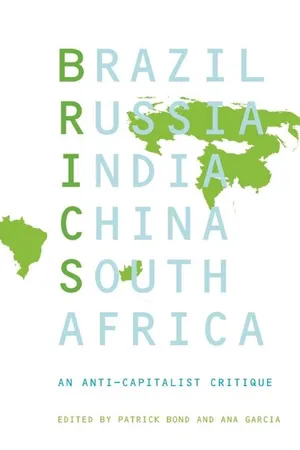
- 320 pages
- English
- ePUB (mobile friendly)
- Available on iOS & Android
About This Book
he emergence of Brazil, Russia, India, China, and South Africa on a global stage has upset the dominance of the United States as the world's only superpower. But can they chart a path toward a more just global economy? This collection, which brings together leading political economists from around the world, argues that the BRICS are actually amplifying some of the worst features of international capitalism.This book aims to fill a gap in studies of the BRICS grouping of countries (Brazil, Russia, India, China and South Africa). It provides a critical analysis of their economies, societies and geopolitical strategies within the framework of a global capitalism that is increasingly predatory, unequal and ecologically self-destructive — no more so than in the BRICS countries themselves.In unprecedented detail and with great innovation, the contributors consider theoretical traditions in political economy as applied to the BRICS, including "sub-imperialism, " the World System perspective and dynamics of territorial expansion. Only such an approach can interpret the potential for a "brics-from-below" uprising that appears likely to accompany the rise of the BRICS.Contributors: Elmar Altvater, Baruti Amisi, Patrick Bond, Omar Bonilla, Einar Braathen, Pedro Henrique Campos, Ruslan Dzarasov, Virginia Fontes, Ana Garcia, Ho-fung Hung, Richard Kamidza, Karina Kato, Claudio Katz, Mathias Luce, Farai Maguwu, Judith Marshall, Gilmar Mascarenhas, Sam Moyo, Leo Panitch, Bobby Peek, Gonzalo Pozo, Vijay Prashad, Niall Reddy, William Robinson, Susanne Soederberg, Celina Sørbøe, Achin Vanaik, Immanuel Wallerstein and Paris Yeros.
Frequently asked questions
Information
- • After funding the International Monetary Fund (IMF) with US$75 billion in 2012, in the following year there were two meetings of BRICS leaders (in Durban and St. Petersburg) which pronounced growing dissatisfaction with the Bretton Woods Institutions.
- • The BRICS’ stated intention to create a New Development Bank with capital of US$50 billion, and an IMF-style Contingent Reserve Arrangement with US$100 billion, was accomplished in 2014 at the Fortaleza summit, but ultimately, given the role of neoliberal finance ministers in their conceptualisation, these were celebrated in Washington as complementary to, not competitive with, the existing multilateral financial power structure.
- • A Brazilian directs the World Trade Organisation and, based on a more aggressive policy of liberalisation, tries to break persistent blockages between the US and EU that hinder the growth of global trade.
- • Chinese and Indian economists occupy a second tier of the bureaucracies in the World Bank and IMF.
- • Climate negotiations at the global scale increasingly revolve around Washington’s managed relations with BRICS countries, first through the deal done in 2009 in Copenhagen (involving four of the five BRICS) and then the US-China emissions cuts agreed to bilaterally in 2014.
- • In other bilateral relations with South Africa and India, US President Barack Obama made substantial progress in trips, respectively, during 2013 (twice) and 2015.
- • Soccer remains the most symbolic and profitable commercial component of sports in the imperialist project, with Fifa machinery controlling the game’s World Cup in alliance with elites from host countries South Africa, Brazil and Russia from 2010 to 2018, no matter the vast social costs involved in White Elephant stadium construction and suppression of local unrest. To add insult to injury, key BRICS countries supported Blatter’s continual re-election to world soccer managerial leadership, notwithstanding vast evidence of wrongdoing during his five-term reign.
- • Several members of the BRICS have resisted demands by Western countries to impose stricter intellectual property controls (in the case of medicines this has saved millions of lives, especially in South Africa).
- • Geopolitically, some BRICS leaders boldly challenged Washington after revelations of espionage by whistleblower Edward Snowden and before Washington’s proposed bombing of Syria in 2013. In March 2014, the BRICS implicitly supported Russia in the conflict over Crimea, for which the G7 imposed sanctions and expelled Moscow (Putin had originally been scheduled to host the G8 meeting in Sochi a few weeks later). BRICS foreign ministers even successfully threatened to withdraw from the subsequent G20 summit in Australia in late 2014, were it to have become a G19 without Russia.
- • In May 2014, Russia agreed to supply gas to China using local currencies, not the US dollar, seeking to partially reduce Russia’s dependence on sales to the European market as sanctions resulting from the Ukraine chaos loomed.
- • In early 2015, dramatic economic developments began unfolding as this book went to press, as emerging markets faced financial stress, as the Russian rouble crashed because of sanctions and the oil price collapse, and as China initiated an Asian Infrastructure Investment Bank, whose co-founders included the richest European countries and the Bretton Woods Institutions, leaving the Obama administration diplomatically embarrassed.
Table of contents
- BRICS
- List of contributors
- List of abbreviations
- 1. Introduction
- Part 1: Sub-imperial, inter-imperial or capitalist-imperial?
- Part 2: BRICS ‘develop’ Africa, Latin America and Eastern Europe
- Part 3: BRICS within global capitalism